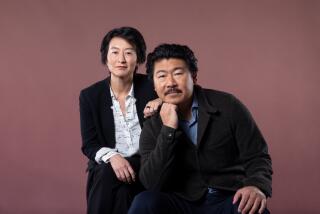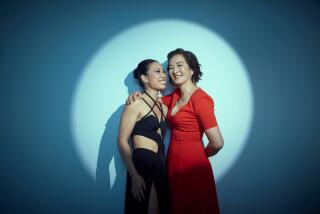Innocence lost
- Share via
This book is a surprise. It’s a footnote-studded, scholarly work about a subject beyond the ken of most Americans: the lives of cultivated upper-class people in China before the Japanese invasion and the Communist revolution. Yet it’s also a series of accessible, often moving portraits of individuals.
The idea for this kind of narrative came to Annping Chin, who teaches history at Yale, when she met Chang Ch’ung-ho, an expert on Chinese calligraphy, poetry and opera. Ch’ung-ho was the youngest of four sisters born between 1908 and 1914 -- all still alive and willing to be interviewed. The sisters’ great-grandfather, Chang Shu-sheng, led imperial forces to victory over the Taiping rebels in the 1860s. His reward was thousands of acres of land, the source of his descendants’ wealth. Like the Meiji reformers in Japan, he pondered how China could avoid subjugation by the West.
But change was difficult in a society so steeped in tradition. The amorality of the Western scientific method grated on the Chinese, for reasons Chin makes us understand. Two thousand years of Confucian thought underlay every ethical stance, every aesthetic gesture. For example, the sisters revered their mother for creating a serene and happy home. She was a “good woman” -- and Chin shows us how the meaning of those two words was explored by centuries of poets and commentators.
The sisters’ father, Chang Wu-ling, was no warrior. He lived off the family income; his only significant project -- though one that illustrated his generosity and liberality -- was to endow a girls’ school, where his daughters went. The Buddhist great-aunt who raised Ch’ung-ho was likewise a believer in learning. Thus armed, the sisters ventured into the upheavals of the 20th century. In recounting their lives, Chin had access to diaries, photos and other documents, as well as the sisters’ recollections of their nurse-nannies -- peasant widows whose devotion was matched by their skepticism of newfangled things.
All the sisters were fans of Chinese opera, and the oldest, Yuan-ho, went so far as to marry a former opera star, though the match was considered beneath her. Her husband failed in business. He and Yuan-ho remained in Shanghai when the Japanese occupied it in the 1930s, and moved to Taiwan just before the Communist takeover in 1949. The next-oldest, Yun-ho, had a tough, assertive personality. During the Cultural Revolution, when she was nearly 60 and under pressure to inform on her friends, she outwitted her youthful interrogators -- a feat she attributed to performing opera as an amateur, which gave her timing, self-control and rhetorical skill.
The third sister, Chao-ho, married one of China’s most famous prewar novelists, Shen Ts’ung-wen. The Japanese war in China’s interior didn’t faze them, but Communist rule depressed Shen and silenced him as a writer. Chao-ho became an editor of government-approved magazines.
Ch’ung-ho, the scholar of the family, moved to the United States in 1949. In Connecticut, she has planted a replica of a Chinese garden, which, like the early photos of the Chang girls -- open-eyed, attractive, eager to face the century ahead of them -- is a bridge to a lost world that “Four Sisters of Hofei” helps bring to life again.
More to Read
Sign up for our Book Club newsletter
Get the latest news, events and more from the Los Angeles Times Book Club, and help us get L.A. reading and talking.
You may occasionally receive promotional content from the Los Angeles Times.










